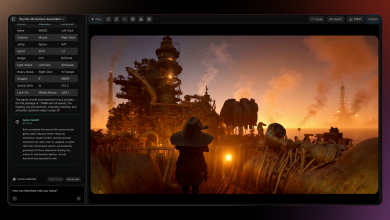
Britain earned itself an unenviable reputation as a stagnation nation in the years following 2008’s financial crisis. This wasn’t just clever wordplay, it was warranted. Sizeable productivity growth has eluded UK workplaces for over 15 years. Current productivity levels are 24% lower than they would have been had pre-2008 trends continued.
Comparing UK productivity to countries like France and Germany, which are ahead by 13% – 28%, it’s clear that UK productivity needs a boost. This slow growth of productivity – caused by factors like inflation, the pandemic, and Brexit – can’t be fixed overnight. Technology, however, can play a key role in providing a much-needed boost. And today, that technology is artificial intelligence (AI).
In fact, former Prime Minister Tony Blair, recently argued that due to the mostly untapped potential of AI, there has never “been a better or more exciting time to be governing.” He’s not wrong — and this excitement should extend to workplace leaders, too.
Research from Workday has found that across the board, businesses with high AI maturity – that is, where AI has been deployed and adopted to an advanced degree – are already reaping the productivity rewards. Conversely, those not planning to invest in AI risk falling behind.
Given the high stakes, what role does leadership play in enabling businesses to become AI mature and what steps should they take to fulfil that role?
Want your business to be AI-ready? Lead from the front
Our research shows clearly that AI maturity correlates with higher growth ambitions and this sentiment is mirrored between leaders and employees. At companies where AI deployment is advanced, 18% is considered a good benchmark for annual business growth by employees against 10% in businesses where AI deployment has yet to commence.
At the leadership level, the discrepancy is ever larger – 25% and 13% respectively. This is supported, strongly, by the fact that AI maturity connects to higher success in hitting growth targets, which is all the more impressive given the higher ambitions noted above. More than four-fifths (85%) of employees at companies where AI deployment is mature state that growth targets were hit. This climbs to a staggering 96% at the leadership level.
It’s impossible to ignore this data – AI mature companies are reporting both bigger growth ambitions and a greater ability to achieve those goals.
It also became clear from the research that those with AI maturity are paying closer attention to overall productivity levels in their organisations, and using tools to track them. As a final case in point, AI is very clearly linked to greater overall productivity for both employees and leaders. In companies where AI deployment is mature, leaders report being productive for 6.1 hours out of an 8-hour workday. This is compared to the 5.7 productive hours leaders report in companies that have no plans to roll out AI.
However, it’s also apparent that leaders are more likely to be aware of the benefits AI offers. The responsibility of helping companies grow with AI – and to share the benefits across all teams – therefore falls to those leaders. This is no easy task but with the right strategy it’s more than achievable – and the rewards are well worth the investment.
Leadership is key to making a business AI-ready – and that starts with trust
The benefits are there and clear, but trust in AI is lacking. Over 93% of leaders and employees alike have at least some reservations about trusting AI. Those reservations are primarily related to safety and privacy, and ensuring that teams are equipped to learn to use the technology. The key to overcoming this, from a leadership perspective especially, is bridging the trust gap.
That comes from leveraging artificial intelligence that is responsibly developed and fully transparent. This means that those who use it can do so confidently.
And they must be empowered to do so because the longer companies leave their AI journey to the wayside the more they stand to lose. Put to good use, AI could untap £119 billion worth of productive work for UK enterprises through efficient time savings stemming from the automation of repetitive work and streamlined processes. Teams must therefore come together to learn to use AI and to trust it, opening themselves to the reward and engagement it offers. That starts with leadership.
Leaders must promote transparency and champion their use of AI in the wider business. They must also ensure that the business invests in skills and platforms that drive workplace efficiency. Ultimately, the onus is on leaders to show that AI, when deployed responsibly, can be trusted and used to set an organisation apart.
This can be an intimidating prospect for leaders and workers alike but by following tested steps, it doesn’t have to be. Leaders should start by identifying specific use cases in departments like IT or finance. Following that, they should work up guidelines and policy, and begin rolling AI out to those disciplines. While these first steps are the biggest ones to take, they’re also workers’ first real introduction to the technology.
Change with AI takes time, but patience pays off
Of course, these initial steps don’t lead to AI maturity overnight. That takes a consistent, measured approach to rolling it out. However, this is where leaders should start.
AI has reached the point where it can turn the UK’s productivity fortunes around, and companies with high AI maturity are cases in point.
It’s now up to leaders and industry at large to empower businesses to let AI get down to business, enabling it to help close the productivity gap to the benefit of our employees, organisations, and the economy as a whole.




